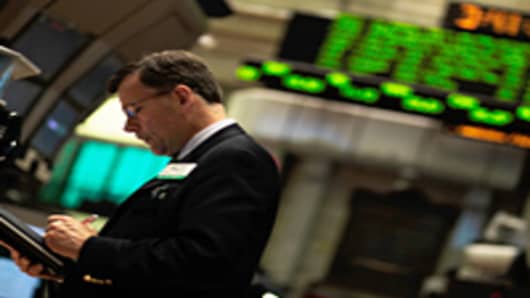Another factor at work is that ECB officials have been talking about inflation, and that has traders betting on a rate hike sooner rather than later. On Friday, ECB executive board member Lorenzo Bini Smaghi was the latest to stir the speculation, saying the central bank must monitor rising price pressures more vigilantly.
"It's strange. Nobody can explain where it's coming from. It's very strange," Brown Brothers Harriman currency strategist Win Thin said of the ECB borrowing. "The bad thing is the ECB is not saying anything. If you want to be a conspiracy theorist that makes you think something is going on."
Thin said it's surprising the euro holds up as well as it does, given the negative news around it. The dollar fell 1 percent against the euro in the past week. The euro was at 1.3686 Friday.
UPDATE:Reuters reported on Saturdayfrom a source that two Irish banks were behind the jump in ECB borrowing as they try to sell their deposit books.
Econorama
The week's economic data kicks off Tuesday with S&P/Case-Shiller home prices. Other housing data includes existing home sales Wednesday and FHFA home prices Thursday.
Consumer confidence is reported Tuesday and consumer sentiment is reported Friday. On Thursday, weekly jobless claims and durable goods are also released. On Friday, the government releases its revision to fourth quarter GDP.
Earnings Central
A flurry of retail earnings dominate the coming week's earnings calendar. Wal-Mart, Home Depot , Macy's , Barnes and Noble, RadioShack and Office Depot report Tuesday. Lowes, Saks, TJX, Limited Brands and Dollar Tree report Wednesday. Target, Sears, Safeway, Gap and Kohl's report Thursday, and JCPenney reports Friday.
Besides retailers, Hewlett-Packard, Chesapeake , Mohawk and Hertz report after Tuesday's bell. DirecTv, Fluor, Vornado, Washington Post and Transocean report Wednesday. General Motors, Newmont Mining, CMS Energy, Dish, Salesforce.com and Imax report Thursday. Tenet Healthcare, Rowan and Public Storage report Friday.
Berkshire Hathaway releases earnings along with its annual letter to shareholders on Saturday.
Questions? Comments? Email us at marketinsider@cnbc.com




